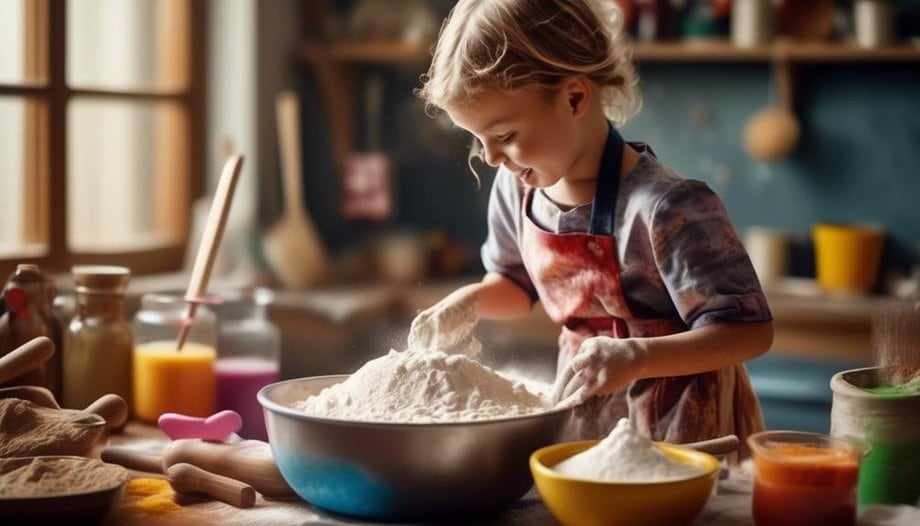How to Foster a Love for Cooking in Kids

Foster a love for cooking in kids by empowering them to explore and embrace the kitchen. This will unlock a world of possibilities and ignite their passion for culinary adventures.
Involving Kids in Meal Planning
Get your kids excited about meal planning by involving them in the decision-making process and giving them a sense of ownership and responsibility.
One way to do this is by allowing them to choose recipes from a selection of options in cookbooks or online. This not only engages them in the meal planning process, but also sparks their interest in cooking.
Encourage your kids to participate in meal planning by asking for their input and ideas on what to cook. By valuing their opinions, you make them feel important and involved in the decision-making process.
Another way to involve your kids in meal planning is by taking them grocery shopping with you. Allow them to pick out ingredients for the meals they'll be helping to prepare. This fosters a sense of ownership and responsibility as they become more involved in the entire cooking process.
Don't forget to offer positive feedback and praise their efforts when they contribute to meal planning. Creating a supportive and encouraging environment will nurture their interest in cooking and make them more excited to participate.
Finally, involve your kids in the kitchen by assigning them age-appropriate tasks such as washing produce or stirring ingredients. This hands-on participation in meal planning will further enhance their sense of ownership and responsibility.
Making Cooking a Fun and Educational Activity
Making cooking a fun and educational activity for kids is all about fostering a sense of exploration, creativity, and learning in the kitchen. One way to achieve this is by encouraging sensory play and exploration. Let your kids get their hands dirty with ingredients like flour or cookie cutters. This not only stimulates their senses but also allows for creative play. Create a dedicated space in your kitchen where they can engage in sensory activities without worrying about making a mess.
Another way to make cooking enjoyable for kids is by letting them choose recipes from cookbooks. Allowing them to make decisions and be engaged in the cooking process gives them a sense of ownership and excitement. Encourage them to try new cooking tasks and provide positive feedback when they do. This fosters a supportive and nurturing environment, where they feel confident and motivated to explore new culinary skills.
Even if your children aren't able to perform complex tasks, include them in kitchen activities. This helps them develop a sense of comfort and familiarity in the kitchen. Engage them in conversations about what they see and experience, using cooking activities as opportunities for language development and vocabulary expansion.
Creating a Positive and Supportive Cooking Environment
Now that you've set the stage for a fun and educational cooking experience, it's important to create a positive and supportive environment for your little chefs.
Encouraging kitchen exploration allows them to discover new ingredients and techniques, building their confidence through your guidance.
Embrace their creativity and experimentation, letting them choose recipes and try new and intriguing options.
Encouraging Kitchen Exploration
To create a positive and supportive cooking environment for your kids, foster their love for cooking by encouraging kitchen exploration. Here are some practical ways to do just that:
- Provide opportunities for sensory play with ingredients like flour and dried beans. Let your children feel and explore different textures, allowing them to develop a deeper connection to the ingredients they work with.
- Create a dedicated space for sensory play in the kitchen with child-friendly utensils. Having their own area will make your kids feel more involved and excited about cooking.
- Let children choose recipes and involve them in the decision-making process. Giving them the freedom to pick what they want to cook won't only foster their love for cooking but also boost their confidence and independence.
- Offer positive feedback and encouragement, focusing on their efforts and growth. Praise their creativity and willingness to try new things. This will create a supportive environment where they feel safe to explore and make mistakes.
Building Confidence Through Guidance
Encouraging kitchen exploration is just the beginning – now let's focus on building confidence through guidance and creating a positive and supportive cooking environment for your kids.
Teaching kids cooking skills requires patience, encouragement, and a nurturing atmosphere. Guide your children in exploring different ingredients and let them be creative with tools like flour and cookie cutters. Provide positive feedback, encouragement, and support when they try new cooking tasks.
Involve them in kitchen activities, even in simple tasks like stirring or pouring, to make them feel included and valued. Engage them in conversations about what they see and experience in the kitchen to foster language development.
Embrace mistakes as part of the learning process and celebrate their achievements, no matter how small. By creating a positive and supportive cooking environment, you can help your kids build confidence and develop a love for cooking.
Embracing Creativity and Experimentation
Embrace the joy of creativity and experimentation in the kitchen, fostering a positive and supportive environment for your kids to explore the world of cooking. Here are four ways to encourage their culinary creativity:
- Provide a variety of cooking classes and workshops that allow your children to learn new techniques and try different recipes. This will help them expand their culinary horizons and discover new flavors.
- Encourage your kids to embrace their creativity by allowing them to choose recipes and be part of the decision-making process. This will give them a sense of ownership and excitement about cooking.
- Focus on positive feedback and encouragement. Celebrate their culinary creations, no matter how simple or elaborate, and emphasize the importance of trying new things and learning from their experiences.
- Include your children in hands-on kitchen activities, giving them age-appropriate tasks and tools. This will help them feel comfortable and engaged, and foster a love for cooking that will last a lifetime.
Teaching Basic Cooking Skills to Kids
Now let's talk about teaching basic cooking skills to kids.
Safety in the kitchen is essential, so start by teaching them about proper handling of utensils and appliances.
Give them age-appropriate tasks to build their confidence and keep them engaged, like measuring ingredients or stirring.
And most importantly, make it fun! Incorporate games, storytelling, and even music to create a positive and enjoyable cooking experience for your little chefs.
Safety in the Kitchen
To ensure a safe and enjoyable cooking experience for your child, it's essential to teach them basic kitchen safety rules and standards. Here are four important safety tips to keep in mind when cooking with kids in the kitchen:
- Use kitchen towels when handling hot items from the oven or stove: Teach your child the importance of using kitchen towels or oven mitts to protect their hands from burns. Safety should always be the top priority.
- Sanitize or wash hands before starting any recipe: Teach your child the importance of good hygiene in the kitchen. Encourage them to wash their hands thoroughly with soap and water before handling any food to prevent the spread of germs.
- Wear well-fitted cotton clothes to prevent fire accidents: Loose clothing can easily catch fire, so it's important to dress your child in well-fitted cotton clothes when cooking. This will minimize the risk of accidents and keep them safe.
- Supervise your child in the kitchen to prevent accidents: Always keep a close eye on your child while they're cooking. Supervision is crucial to ensure their safety and prevent any mishaps.
Age-Appropriate Tasks
Start by assigning your child simple tasks that are age-appropriate and build their confidence in the kitchen. Mastering cooking requires starting with the basics.
For younger children, tasks like washing produce, greasing pans, or measuring ingredients can be a great way to involve them in the cooking process. These activities not only teach them about food preparation but also develop their fine motor skills.
As they grow older, you can gradually introduce them to other activities like meal preparation, such as chopping vegetables or stirring ingredients. It's important to teach them basic kitchen safety rules and techniques to ensure their well-being.
Providing positive feedback and praising their efforts will encourage their enthusiasm for cooking. Letting them choose recipes is another way to develop their interest and engagement in the process.
Making It Fun
As your child becomes more comfortable with age-appropriate tasks in the kitchen, it's time to turn up the fun factor and teach them some basic cooking skills. Here are four ways to make it fun and foster a love for cooking in kids:
- Incorporate sensory play: Let your child explore ingredients like flour, cookie cutters, and dried beans. Encourage their creativity by allowing them to experiment with different textures and shapes.
- Let them choose recipes: Involve your child in the decision-making process by letting them choose recipes from cookbooks. This increases their engagement and excitement as they get to make something they're interested in.
- Provide encouragement: When your child tries new tasks, offer plenty of positive feedback. Focus on their efforts, determination, and concentration. This will boost their confidence and make them enjoy the cooking process even more.
- Include them in kitchen activities: Even simple tasks like stirring or pouring can help children develop a sense of comfort and familiarity in the kitchen. By including them in these activities, you're not only teaching them basic skills but also creating lasting memories together.
Exploring Different Cuisines and Recipes Together
Broaden your child's culinary knowledge by exploring a variety of cuisines from around the world together. One of the best ways to foster a love for cooking in kids is to introduce them to different flavors and cooking styles. Start by selecting recipes that are simple and kid-friendly, making the experience enjoyable for both of you. As you embark on this culinary adventure, allow your children to participate in choosing a different cuisine to explore each week. This not only gives them a sense of ownership but also allows them to develop their taste preferences.
To make the exploration more educational, incorporate elements about the culture and history behind the chosen cuisine. Share interesting facts about the ingredients used, traditional cooking techniques, and the significance of certain dishes. This won't only expand their culinary knowledge but also help them appreciate the diverse cultures that exist around the world.
When it comes to actually cooking the dishes, encourage your children to take an active role. Let them measure ingredients, mix, and chop under your guidance. This hands-on experience won't only enhance their cooking skills but also expand their palate as they try new flavors and textures.
As you explore different cuisines together, keep a record of your favorite recipes. Create a recipe book or a digital folder where you can store all the delicious dishes you have cooked. This will serve as a source of inspiration for future cooking adventures and will allow your children to look back on the memories you have created together.
Encouraging Independence and Decision-Making in the Kitchen
Embark on the next step of fostering a love for cooking in your kids by empowering them with independence and decision-making skills in the kitchen. By encouraging independence and decision-making, you can help your children develop confidence, creativity, and a sense of ownership in the kitchen.
- Allow children to choose recipes from cookbooks or options provided. Giving them the freedom to select what they want to cook will make them feel involved and excited about the process. It also allows them to explore their preferences and discover new flavors.
- Provide positive feedback and encouragement for their efforts in the kitchen. Celebrate their achievements, no matter how small. Positive reinforcement will boost their self-esteem and motivate them to continue experimenting.
- Include children in all aspects of the cooking process, even simple tasks. Let them measure ingredients, wash vegetables, or stir the batter. This involvement will make them feel valuable and important contributors to the meal.
- Engage kids in conversations about what they see and experience in the kitchen. Ask them questions about the ingredients, techniques, and flavors. This dialogue not only enhances their learning but also fosters their decision-making skills by encouraging them to think critically about food.
Encouraging independence and decision-making in the kitchen will empower your children to become confident cooks who take pride in their culinary creations. So, let them take charge, make choices, and watch their love for cooking flourish.
Embracing Mistakes and Learning Opportunities
Embracing mistakes in the kitchen is an essential part of fostering a love for cooking in kids, as it teaches them the value of learning and resilience. When children help out in the kitchen, it's important to create an environment where they feel comfortable making mistakes and learning from them.
Mistakes are a natural part of the cooking process and should be embraced as opportunities for growth. Encourage your kids to analyze what went wrong when a mistake happens. Ask them questions like, 'What do you think caused the cake to sink in the middle?' or 'What could we've done differently to prevent the pasta from sticking together?' This helps develop their problem-solving skills and fosters a growth mindset.
Remember to celebrate their efforts and progress, no matter how small. Praise them for trying new recipes or techniques, and highlight the improvements they've made. This emphasizes the importance of learning and resilience in the kitchen.
As parents or caregivers, it's important to lead by example and show your kids that mistakes happen to everyone. Share your own cooking mishaps and how you learned from them. This creates a supportive environment where mistakes are seen as opportunities for growth, rather than failures.
Frequently Asked Questions
How Do I Get My Child Interested in Cooking?
To get your child interested in cooking, find ways to make it fun for them. Let them choose recipes and involve them in the decision-making process. By teaching them how to cook, you're giving them valuable skills and fostering their creativity.
What Is the Best Age for a Child to Cook?
The best age for kids to start cooking is around 2-3 years old. Teaching them to cook has many benefits, like developing their motor skills and fostering independence. It's never too early to get them involved in the kitchen!
Why Do Kids Love Cooking?
Kids love cooking because it allows them to be creative and hands-on, enhancing their sensory development. It also gives them a sense of ownership and boosts their confidence. Cooking helps kids develop important life skills in a fun and practical way.
Is It OK for Kids to CoOK?
Yes, it's okay for kids to cook! Teaching them to cook has many benefits like building confidence and independence. Just remember to prioritize safety by supervising them, using age-appropriate tools, and teaching them proper handling of hot objects and sharp utensils.










